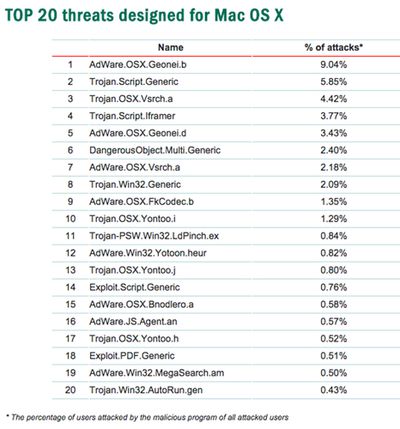Apple's OS X faced an increasing number of malicious attacks in the past year with antivirus firm Kaspersky Lab noting roughly 3.7 million infection attempts blocked by its software, the firm reports in its 2014 Security Bulletin (via The Telegraph). The annual report quantifies malicious activity by analyzing attacks blocked by Kaspersky's anti-malware products.
According to the 2014 report, the average Mac user faced nine threats in the past year. The study tracked nearly 1500 new malware programs targeting OS X over the past year, 200 more than in the previous year. More than half of the detected malicious threats were AdWare modules that add links to default browser bookmark lists, change the default browser search engine, and insert advertising links in order to generate ad revenue.

Other more serious but less prevalent threats include a Trojan keylogger, a screenshot capture program, and the Wirelurker malware that attempts to steal data from iOS devices connected to a Mac. Though increasing, the number of malicious programs on OS X is lower than what is recorded on competing platforms such as Windows. Overall, Kaspersky Lab says its software blocked over six billion malware installation attempts over the past year, meaning that OS X remains a tiny fraction of devices being targeted.
As an antivirus vendor, Kaspersky Lab naturally has a vested interest in convincing customers to adopt its products, but it also puts the company in a good position to monitor threats and collect data from those using its tools.




















Top Rated Comments
Here's the thing that people love to forget: OS X is damn secure. It's a UNIX system. Apple implement so many security features to prevent malware installations. They put additional sandboxes to ensure that if a malicious application is installed, it can't edit or access any of the really important stuff (protected by root, blah blah).
How many hackers out there would love to make a Mac-bricking virus? How many hackers would love to have that under their belt -- those brilliant brownie points of screwing a smug Mac users' computer. But it hasn't been done -- yet.
And that's down to marketshare? No, it's because OS X is difficult, if not practically impossible, to hack. With every new iteration of OS X they make more under-the-hood changes. With Mavericks they even changed how third-party apps used Accessibility features, to increase security.
Fact is: Windows is easy to screw. You can delete some registry entries even without admin privileges. All the services are stored in the registry. Windows updates, every single core function, or file allocation, is buried somewhere in the registry. The amount of times I've remoted into a computer to see the Windows Firewall/Update service deleted. Not 'disabled', full on deleted. Simply a folder deleted from the registry, and boom -- a right PITA to fix.
Microsoft are an utter joke when it comes to things like this. Using the marketshare argument is frankly a total insult to the OS X programmers, Apple's mentality, and people who get inundated with calls about malware/viruses on Windows PCs.
That doesn't happen because they can't. Period.
Please be careful with the terminology you use. Malware =/= virus. I am still unaware of any legitimate virus on a Mac, i.e. malicious software that attacks without intervention from the user.
On the other hand, no system is secure against malware, i.e. software that requires the user to install it. Granted it may be very sneaky about it, but the only way bad software gets on a Mac is if a careless or ignorant user puts in on. And I don't mean ignorant in a pejorative way, just a not aware way.
This is a myth, mac users are in no way less tech savvy than windows users in general.
Market share argument is easier to digest for non-OSX crowd, not the truth.
The truth is, OS X is damn secure and stable, but the majority of windows users (who like the market share argument) are not ready to admit it.